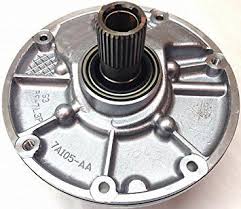Market Overview:
Automotive transmission pumps are a vital component of an automatic transmission system. They are responsible for maintaining the hydraulic pressure necessary for the smooth operation of the transmission system. These pumps ensure the proper flow of transmission fluid to the different components of the system, such as the torque converter, clutch packs, and valve body.
The advantages of automatic transmission systems include an easy driving experience, better fuel efficiency, and improved vehicle performance. With increasing traffic congestion and a rise in the number of vehicles on the road, demand for automatic transmission vehicles is growing. This, in turn, is fueling the demand for automotive transmission pumps, as they play a crucial role in ensuring the optimal performance of automatic transmission systems.
The global Automotive Transmission Pump Market Size is estimated to be valued at US$ 35.08 billion in 2023 and is expected to grow at a CAGR of 5.5% during the forecast period 2023-2030, as per the latest report by Coherent Market Insights.
Market Key Trends:
One key trend in the automotive transmission pump market is the increasing adoption of electric transmission pumps. Electric transmission pumps offer several advantages over traditional mechanical pumps, such as improved fuel efficiency, reduced emissions, and increased reliability. These pumps can be controlled electronically, allowing for precise control over the flow and pressure of the transmission fluid. Additionally, electric pumps eliminate the need for engine power to operate, resulting in reduced power loss and improved overall vehicle efficiency.
For instance, Magna International Inc., one of the key players in the market, offers an electric transmission pump called “eDrive” that integrates an electric motor with the pump. This innovative solution improves fuel efficiency and reduces CO2 emissions, making it suitable for electric and hybrid vehicles.
PEST Analysis:
Political: The automotive industry is subject to various political factors, such as government regulations, trade policies, and safety standards. Governments worldwide are adopting stricter emission regulations to reduce carbon emissions from vehicles. These regulations are encouraging the adoption of advanced transmission systems, including those equipped with transmission pumps.
Economic: Economic factors, such as GDP growth, disposable income levels, and consumer purchasing power, influence the demand for automotive transmission pumps. Growing economies and increasing disposable incomes lead to higher vehicle sales, thereby driving the demand for transmission pumps.
Social: The changing consumer preferences towards automatic transmission vehicles and the increasing awareness about the benefits of automatic transmissions are significant social factors that contribute to the growth of the automotive transmission pump market.
Technological: Technological advancements in transmission systems, such as the development of electric pumps and intelligent transmission controls, are driving market growth. These advancements improve fuel efficiency, reduce emissions, and provide enhanced vehicle performance.
Key Takeaways:
The global automotive transmission pump market is expected to witness high growth, exhibiting a CAGR of 5.5% over the forecast period. The increasing demand for automatic transmission vehicles is one of the key drivers for market growth.
In terms of regional analysis, Asia Pacific is expected to be the fastest-growing and dominating region in the automotive transmission pump market. The region has a strong presence of automotive manufacturing hubs, such as China and India, coupled with the increasing disposable incomes of consumers.
Key players operating in the global automotive transmission pump market include Aisin Seiki Co., Ltd., Bosch Limited, Magna International Inc., ZF Friedrichshafen AG, Schaeffler AG, BorgWarner Inc., JTEKT Corporation, Denso Corporation, Eaton Corporation, Hitachi Automotive Systems, Ltd., Valeo SA, GKN Automotive Limited, Hyundai WIA Corporation, Aisin AW Co., Ltd., and Metaldyne Performance Group Inc. These companies are focusing on product innovations, partnerships, and collaborations to gain a competitive edge in the market.





